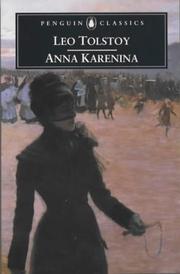Vronsky, meanwhile, in spite of the complete fulfilment of what he had so long desired, was not completely happy. ...It showed him the eternal error men make in imagining that
happiness consists in the realization of their desires. - Anna Karenina, 1877
I was falling in love with paperback Penguin classics for the first time (though I refused to read the 'introductions', the aim of which seemed to be to spoil both independent discovery and simple enjoyment of the novel).
I'd grown up with thousands - yes, thousands - of textured, earthy-toned, loamy-smelling books from the 1800s. But novelty is often given undue importance at age 17. In my case, a fresh, creamy-paged paperback with a venerable penguin on the spine was a strong incentive to read books I probably wouldn't have otherwise tried.
Now, I have very little interest in or time for adultery narratives, which is what I think Tolstoy's Anna Karenina is filed under in a lot of minds. I cannot imagine ever reading Madame Bovary. Flaubert's work is less interesting to me than the stove manual my husband read to me two nights ago (and let me tell you, I don't do manuals - there's a reason he had to read it to me). Brideshead Revisited wouldn't have been on my horizon until a very trusted friend convinced me to read it (and she was right to do so...but more on that some other day).
But Anna Karenina took my breath away. I spent the next decade telling my mother she should read it, and I'm happy to say that just last year she did, and loved it.*
Now, the thing I want to say is not that Anna K is a great book/Great Book (Kitty! Levin! Karenin! Oh, there's so much to this book!), but that it served more than what one might call a purely 'literary' purpose in my moral formation, if you will.
When I opened the book I firmly believed that adultery was wrong, wrong, wrong. When I closed the book, I knew that it was also painful, boring, relationship-fracturing, parasitical, and engendering of endless and irremediable regrets. (As an aside, let me say that it is also totally unappealing from the standpoint of such conjugal bliss as I am now blessed to enjoy!!)
And this, I believe, is one of the best features of great literature - that through it, we can gain wisdom. We can learn from other people's mistakes. Even fictional people in 19th century Russia.
But Anna Karenina took my breath away. I spent the next decade telling my mother she should read it, and I'm happy to say that just last year she did, and loved it.*
Now, the thing I want to say is not that Anna K is a great book/Great Book (Kitty! Levin! Karenin! Oh, there's so much to this book!), but that it served more than what one might call a purely 'literary' purpose in my moral formation, if you will.
When I opened the book I firmly believed that adultery was wrong, wrong, wrong. When I closed the book, I knew that it was also painful, boring, relationship-fracturing, parasitical, and engendering of endless and irremediable regrets. (As an aside, let me say that it is also totally unappealing from the standpoint of such conjugal bliss as I am now blessed to enjoy!!)
And this, I believe, is one of the best features of great literature - that through it, we can gain wisdom. We can learn from other people's mistakes. Even fictional people in 19th century Russia.
And let me tell you, this is a book in which the characters make a lot of mistakes. Some of the consequences you see coming - charging towards the characters like the novel's infamous steam train - some of them you don't. Some of the characters are redeemed when you have lost hope for them, others cling stubbornly to their foolish, pointless, uglifying choices just when you expect the reverse.
So this is just one reason why I won't be seeing the new film adaptation of Anna K coming out this year. This story should never shoe-horned into a stylised melodrama with doll-house sets. Anna should not be gilded over into Keira Knightley's passionate-but-doomed-by-society-proto-feminist in asymmetrical Klimt couture.
What are viewers of Joe Wright's film going to learn? All the things they already 'knew' about those judgemental people in the bad old days, I'm guessing -- nasty old biddies peering through their opera-glasses at poor Anna!
When we succumb unquestioningly to what C.S. Lewis called 'chronological snobbery', we lose so much of our heritage - both of wisdom and folly - as God's fallen image-bearers.
A Great Book can cry aloud to us on the street corner, in a faint echo of the Lady Wisdom in Solomon's Proverbs:
So this is just one reason why I won't be seeing the new film adaptation of Anna K coming out this year. This story should never shoe-horned into a stylised melodrama with doll-house sets. Anna should not be gilded over into Keira Knightley's passionate-but-doomed-by-society-proto-feminist in asymmetrical Klimt couture.
What are viewers of Joe Wright's film going to learn? All the things they already 'knew' about those judgemental people in the bad old days, I'm guessing -- nasty old biddies peering through their opera-glasses at poor Anna!
When we succumb unquestioningly to what C.S. Lewis called 'chronological snobbery', we lose so much of our heritage - both of wisdom and folly - as God's fallen image-bearers.
A Great Book can cry aloud to us on the street corner, in a faint echo of the Lady Wisdom in Solomon's Proverbs:
“How long, O simple ones, will you love being simple?
and fools hate knowledge?
If you turn at my reproof,
behold, I will pour out my spirit to you;
I will make my words known to you."
something really special.






